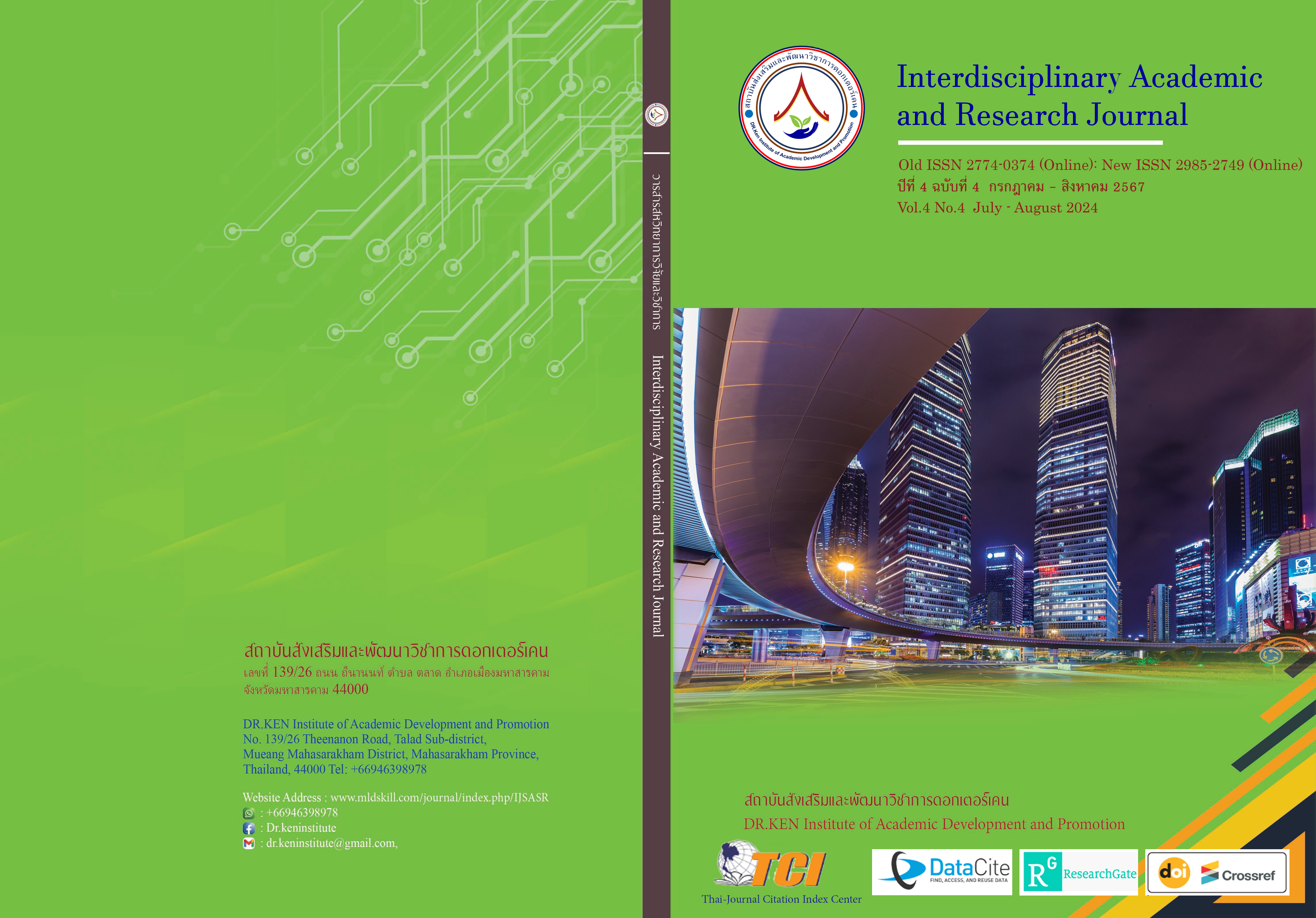Guidelines for Developing Academic Leadership for School Administrators Under the Office of Maha Sarakham Primary Educational Service Area 2
DOI:
https://doi.org/10.60027/iarj.2024.275508Keywords:
Guidelines for Developing; , Academic leadership; , School administratorsAbstract
Background and Aims: Visionary leadership is the ability of a leader to thoroughly understand the organization's circumstances, and clearly define the roles and direction of the organization. The capacity to disseminate ideas that inspire employees to embrace them and lead the organization towards the appropriate and fitting direction and ready to embrace changes and competition that arise. School administrators are considered crucial individuals for the development of the organization. Because administrators are the ones driving the organization toward its desired direction efficiently and effectively. Therefore, this research aims to study the current desirable state and the priority need of academic leadership for school administrators under the Office of Maha Sarakham Primary Educational Service Area 2 and to study the guidelines for developing academic leadership for school administrators under the Office of Maha Sarakham primary educational service area 2
Methodology: The research procedures were divided into two phases. The first stage was to study the current, the desirable state, and the priority need of academic leadership for school administrators, The sample group consists of 310 individuals, comprising 83 school administrators and 227 teachers, by stratified random sampling. The research instrument was a rating scale a 5-level questionnaire, with an index of item objective congruence is 0.80 - 1.00, and A reliability is 0.96. The discriminatory power is between 0.35 - 0.75. The statistics used for data were analyzed by mean, and standard deviation. The second stage was the study of the guidelines for developing academic leadership for school administrators. The key informant group comprises 9 experts for study guidelines and 7 experts for assessment of the development guideline. The research instrument was a semi-structured interview form and assessment form the suitability and feasibility of development guideline
Results: 1. The overall current situation is generally at a high level, with the desired overall condition being at the highest level. The index of ranking priority needs rank ranges from 0.30 - 0.34, Rank from high to low level was cooperation, 1) Curriculum management 2) Supervision and development of internal quality assurance systems 3) Learning management 4) Development of media and learning resources 5) Assessment and research measurement. 2. The guidelines for developing academic leadership for school administrators consist of 24 guidelines, follows: 5 guidelines for curriculum management, 4 guidelines for supervision and development of internal quality assurance systems, 4 guidelines for Learning management, 4 guidelines for development of media and learning resources and 5 guidelines for assessment and research measurement. The results of the evaluation of the suitability and feasibility of development guidelines overall were at the highest level.
Conclusion: The academic leadership of educational administrators is the ability to guide school personnel to collaborate effectively until the goals of the educational institution are achieved. In particular, academic work, which is the most crucial aspect of educational management, ensures the efficiency of education administration in educational institutions. School administrators need to have a deep understanding and knowledge of the content scope and principles of academic management to be effective, curriculum management, instructional management, internal Supervision, educational assessment and evaluation, and quality assurance in education.
References
กระทรวงศึกษาธิการ. (2553). พระราชบัญญัติการศึกษาแห่งชาติ. พ.ศ. 2542 และที่แก้ไขเพิ่มเติม(ฉบับที่ 3) พ.ศ. 2553. กรุงเทพฯ : สำนักงานเลขาธิการสภาการศึกษา.
นพพล ศุภวิทยาเจริญกุล. (2560). ภาวะผู้นำของผู้บริหารสถานศึกษาสังกัดสำนักงานเขตพื้นที่การศึกษาประถมศึกษาสกลนคร เขต 1. วิทยานิพนธ์ครุศาสตรมหาบัณฑิต สาขาวิชาการบริหารการศึกษา มหาวิทยาลัยราชภัฏสกลนคร.
ปรียาพร วงศ์อนุตรโรจน์. (2553). การบริหารงานวิชาการ. กรุงเทพฯ : บริษัท พิมพ์ดี จำกัด.
ปรียาภรณ์ เรืองเจริญ. (2560). ภาวะผู้นำทางวิชาการของผู้บริหารสถานศึกษาสังกัดสำนักงานเขตพื้นที่การศึกษาประถมศึกษาชัยภูมิ เขต 2. วิทยานิพนธ์ปริญญามหาบัณฑิต: มหาวิทยาลัยราชภัฏชัยภูมิ.
เพ็ญนภา พลับฉิม. (2559). ภาวะผู้นำทางวิชาการของผู้บริหารสถานศึกษาที่ส่งผลต่อประสิทธิผลของโรงเรียนสังกัดสำนักงานเขตพื้นที่การศึกษาประถมศึกษาราชบุรี เขต 2. วิทยานิพนธ์ปริญญามหาบัณฑิต: มหาวิทยาลัยราชภัฏนครปฐม.
เพ็ญนภา ศรีแปลก. (2563). การศึกษาภาวะผู้นำของผู้บริหารสถานศึกษาขั้นพื้นฐาน สังกัดสำนักงานเขตพื้นที่การศึกษาประถมศึกษาสระแก้ว. วิทยานิพนธ์ครุศาสตรมหาบัณฑิต: มหาวิทยาลัยราชภัฏรำไพพรรณี.
สำนักงานเขตพื้นที่การศึกษาประถมศึกษามหาสารคามเขต 2. (2565). แผนปฏิบัติการประจำปีงบประมาณ 2565. มหาสารคาม : สำนักงานเขตพื้นที่การศึกษาประถมศึกษามหาสารคาม เขต 2.
สำนักงานคณะกรรมการการศึกษาขั้นพื้นฐาน. (2560). การขับเคลื่อนการศึกษามัธยมศึกษาไทย 4.0 เพื่อการมีงานทำแห่งศตวรรษที่ 21. กรุงเทพ : โรงพิมพ์ชุมนุมสหกรณ์การเกษตรแห่งประเทศไทย จำกัด.
สำนักงานคณะกรรมการการศึกษาขั้นพื้นฐาน. (2563). แนวทางการพัฒนาระบบการประกันคุณภาพการศึกษาตามกฎกระทรวงการประกันคุณภาพการศึกษา พ.ศ. 2561. กรุงเทพฯ : ห้างหุ้นส่วนจำกัด เอ็น.เอ.รัตนะเทรดดิ้ง.
สำนักงานเลขาธิการสภาการศึกษา. (2553). พระราชบัญญัติการศึกษาแห่งชาติ พ.ศ. 2542 ฉบับปรับปรุง พ.ศ. 2545 และฉบับปรับปรุง พ.ศ. 2553. กรุงเทพฯ: โรงพิมพ์พิมพลักษณ์.
สำนักงานเลขาธิการสภาการศึกษา. (2560). แผนการศึกษาชาติ พ.ศ. 2560-พ.ศ. 2579. กรุงเทพฯ : พริกหวานกราฟฟิค จํากัด.
สุวิมล ว่องวาณิช. (2558). การวิจัยประเมินความต้องการจำเป็น. กรุงเทพฯ: สำนักพิมพ์แห่งจุฬาลงกรณ์มหาวิทยาลัย.
Chell, J. (2001). Introducing principals to the role of instructional leadership: A summary of a master’s project by Jan Chell. Retrieved from http://www.ssta.sk.ca/research/leadership/95-14.htm
Cronbach, L.J. (1970). Essentials of Psychological Testing. (3rd ed). New York: Harper and Row.
Davis, K.I., & Thomas, P. I. (1989). Human characteristics and school learning. New York: McGraw Hill.
Krejcie, R.V. & Morgan, D. W. (1970). Determining Sample Size for Research Activities. Educational and Psychological Measurement, 30 (3), 607-610.
Leithwood, K. (1994). Leadership of School Restructuring. Educational Administration Quarterly, 30 (4), 449-516.
McEwan, E.K. (2003). 7 steps to effective instructional leadership. California: Corwin Press.
Downloads
Published
How to Cite
Issue
Section
License
Copyright (c) 2024 Interdisciplinary Academic and Research Journal

This work is licensed under a Creative Commons Attribution-NonCommercial-NoDerivatives 4.0 International License.
Copyright on any article in the Interdisciplinary Academic and Research Journal is retained by the author(s) under the under the Creative Commons Attribution-NonCommercial-NoDerivatives 4.0 International License. Permission to use text, content, images, etc. of publication. Any user to read, download, copy, distribute, print, search, or link to the full texts of articles, crawl them for indexing, pass them as data to software, or use them for any other lawful purpose. But do not use it for commercial use or with the intent to benefit any business.
















.png)


